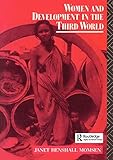Women and Development in the Third World / Momsen, Janet Henshall
Material type: TextLanguage: English Publication details: New York : Routledge, 2001.Description: viii, 115 p. ; 21 cmISBN:
TextLanguage: English Publication details: New York : Routledge, 2001.Description: viii, 115 p. ; 21 cmISBN: - 9780415016957
- 305.4091724 MOM
| Item type | Current library | Call number | Status | Barcode | |
|---|---|---|---|---|---|
 Book
Book
|
Ranganathan Library | 305.4091724 MOM (Browse shelf(Opens below)) | Available | 038190 |
For all societies, the common denominator of gender is female subordination. For women of the Third World, the effects of this position are exacerbated by the legacy of colonialism, economic crisis, and patriarchal attitudes. Feminist critique has introduced the gender factor to development theory, arguing that the equal distribution of the benefits of economic development can only be achieved through a radical restructuring of the process of development. Now, the universal validity of both gender-neutral development theory and the feminist concepts of the post-industrial world are being questioned. In this book, Janet Momsen presents ten worldwide case studies which act as personalized examples of women's lives and coping strategies in the Third World. Her review of policy and practice raises questions about development planning and the empowerment of women. The book concludes with a discussion of the impact of environmental degradation and economic restructuring on women, with a description of the integral position of women in any solution to the current crises facing the Third World.
There are no comments on this title.
